Dr. Mardy's Quotes of the Week (Appreciation")
Feb. 23-March 1, 2025 | THIS WEEK'S THEME: “Appreciation"
Thanks for Keeping Me in Your Thoughts
My thanks to all who wrote this past week to wish me well in my upcoming aortic valve replacement procedure, now scheduled for this coming Thursday.
In addition to their kind words of support and encouragement, many people also went on to express their deep appreciation for my efforts over the years, as well as the role I’ve played in their lives. Much of the praise was so effusive that I had difficulty accepting that the words were actually describing me. To have one or two people tell you how much you mean to them is pretty special, but when hundreds do it in a concentrated period of time, the experience is almost indescribable. In my case, I was so touched that it seemed appropriate to choose appreciation as this week’s theme.
This Week’s Puzzler
On February 27, 2003, this man died at age 74 (from complications related to stomach cancer) at his home in Pittsburgh, Pennsylvania. At a memorial service a few days later, Teresa Heinz Kerry captured an essential aspect of his being when she said of him:
“He never condescended, just invited us into his conversation. He spoke to us as the people we were, not as the people others wished we were.”
Born in Latrobe, Pennsylvania in 1928, he spent much of his early childhood with his maternal grandfather, who introduced him to the world of music (he would later go on to write hundreds of songs, but only one is remembered today). After getting a B.A. in Music Composition in 1951, he was attracted to the new medium of television, but deeply disappointed with the quality of the existing programming. He said later in life:
“I went into television because I hated it so, and I thought there's some way of using this fabulous instrument to nurture those who would watch and listen.”
After struggling for several years in New York City, he began to find his footing in 1954 when he was hired as a puppeteer for “The Children’s Corner,” a children’s television program in Pittsburgh. He soon began thinking about doing his own show, but it would take a dozen years—including three in Toronto, where he developed an early version for Canadian public television—before WQED, the public broadcasting station in Pittsburgh, would launch the program in 1966. The show debuted nationally in 1968, and a year later moved to PBS, where its thirty-three-year run made the host an American icon. He was awarded the Presidential Medal of Freedom in 2002. On March 23, 2018—the fiftieth anniversary of show’s national debut—he was posthumously honored with a commemorative U.S. postage stamp.
In 2001, he delivered the Commencement Address at Vermont’s Middlebury College, where almost all of the students had spent a portion of their early years watching his show. The day before the speech, a graduating senior told him the occasion wouldn’t be complete without their being able to sing the show's theme song. After they did, this week’s Mystery Man—who was also an ordained Presbyterian minister—began his address by saying something that came close to describing how I felt this past week:
“For a long time I wondered why I felt like bowing when people showed their appreciation for the work that I’ve been privileged to do.”
In his address, he went on to add:
Who is this man? What was the name of the television show? And what was the title of his most famous song? (Answers below)
What Role Has Appreciation Played in Your Life?
The American Heritage Dictionary (AHD) defines appreciation this way.
Appreciation comes from the Latin root appretiāre, which means “to set a price on; to value.” In the beginning, the word had a strictly financial connotation, and that continues to this day when, for example, we describe the increased value of an investment as an appreciation.
When the word entered English in the 16th century, it conveyed the original idea of setting a price on something, but by the 17th century, the meaning was figuratively extended to refer to the worth or value of a person. Not long after, it was further extended to such human endeavors as art, music, or opera, as we see in the term aesthetic appreciation. Today, though, we’ll be restricting our attention to the appreciation of people.
The first psychologist to formally express an interest in the topic was William James, a professor of philosophy at Harvard College and Radcliffe College. With the publication of The Principles of Psychology in 1890, James also became the founder of American psychology. In one of his most famous observations, he wrote:
Even those who love this quotation are unfamiliar with the story behind it. In April of 1896, the young women in James’s Philosophy 2A class at Radcliffe sent their professor a potted azalea plant with a note expressing how much he meant to them. James was so moved by the gesture that he wrote a letter to the class a few days later. Referring to his 1890 book, he wrote:
“I now perceive one immense omission in my Psychology—the deepest principle of Human Nature is the craving to be appreciated, and I left it out altogether from the book, because I had never had it gratified till now. I fear that you have let lose a demon in me, and that all my actions will now be for the sake of such rewards.”
All human beings have occasional doubts about their worth, or questions about how effectively they are functioning in the world—and I believe this was happening to James at that period of his life. It’s easy to surmise what he was thinking. Despite my international reputation as a philosopher, am I a good teacher ? Am I also a good role model to my students? And am I making a difference in their lives? These doubts were so deeply buried, that James wasn’t even consciously aware of their existence until they were erased by the kind, generous, and emotionally overwhelming words of his students.
With apologies to Professor James, I don’t think the deepest principle of human nature is the craving to be appreciated, but something deeper and even more profound: the craving to to be cherished, or even treasured, by the people in our lives. If I’m right, the experience of being praised, acknowledged, complimented, and applauded by those closest to us are all things that satisfy this deep human need. That is what happened to me this past week. To recall the words of this week’s Mystery Man, it made me feel as if I was “participating in something truly sacred.”
The emotional significance of appreciation has now also been confirmed by recent findings in brain science. Genuine praise and heartfelt appreciation trigger a cascade of neurochemical reactions in a part of the brain that lights up at the sight of food or money, or the experience of hugging and soothing human touch. The noted American neuroscientist Dr. Alex Korb described it well:
Let me bring my remarks to a close this week by mentioning two things I used to say in my leadership seminars back in the 1980s and 90s:
“One of life’s saddest realities is the failure to adequately express how much we appreciate those we say we love.”
“When one person expresses deep appreciation to another person, two people end up feeling better about themselves.”
The audiences in my seminars were all CEOs—and around 90% male—and most not only pleaded guilty to taking their loved ones for granted, they also pledged to do better in the future. One of my favorite memories from back then came about a week after a seminar I did in Colorado. The man who attended began by saying that the seminar “really got my attention,” and he left with a determination to be more appreciative. He went on to add that, a few days after the seminar, he attempted to rectify the situation by saying to his wife after dinner, “Honey, you know how much I like making lists. Well, today I made a list of the ten things I most appreciate about you.”
Before he could say another word, his wife put up her hands in a “stop” sign, looked him straight in the eye, and said, “I’d love to hear what you appreciate about me, but before you say anything else, please answer this one question: are you having an affair?” We both had a good laugh over the matter, and I recall saying to him that the moral of the story might be expressed this way: “The worst cure for a drought is a sudden and heavy downpour.”
This week, think about the role that appreciation has played in your life. Try to recall moments when your need for appreciation was met, and how it made you feel. Also give some thought to how well you’ve expressed your appreciation to people in your world—especially your loved ones. As you do, let your thinking be stimulated by this week's compilation of quotations on the theme:
We humans are appreciation junkies, especially when it comes from an authority figure or someone in a leadership position. — Jack Altschuler
Do not be chary of appreciation. Hearts are unconsciously hungry for it. — Phillips Brooks
Give love and appreciation to another person or anything, and you give it to yourself. — Rhonda Byrne
You have it easily in your power to increase the sum total of this world’s happiness now. How? By giving a few words of sincere appreciation to someone who is lonely or discouraged. Perhaps you will forget tomorrow the kind words you say today, but the recipient may cherish them over a lifetime. — Dale Carnegie
Every man supposes himself not to be fully understood or appreciated. — Ralph Waldo Emerson
In the strongest relationships, people express appreciation and gratitude far more often than criticism or contempt. — John Gottman
The greatest humiliation in life is to work hard on something from which you expect great appreciation, and then fail to get it. — E. W. Howe
Brains, on the whole, are like hearts, and they go where they are appreciated. — Robert S. McNamara
The way to develop the best that is in a man is by appreciation and encouragement. — Charles M. Schwab
Next to excellence is the appreciation of it. — William Makepeace Thackeray
For source information on these quotations, and more observations on the theme of APPRECIATION, go here.
Cartoon of the Week
Answer to This Week’s Puzzler
Fred Rogers (1928-2003). “Mr Rogers’ Neighborhood.” And, for his most famous song—“Won’t You Be My Neighbor”—go here.
Dr. Mardy’s Observation of the Week
Thanks for joining me again this week. See you next week, when the theme will be “Recovery, Rehabilitation, & Beyond.”
Mardy Grothe
My Two Websites: www.drmardy.com and www.GreatOpeningLines.com
Regarding My Lifelong Love of Quotations: A Personal Note



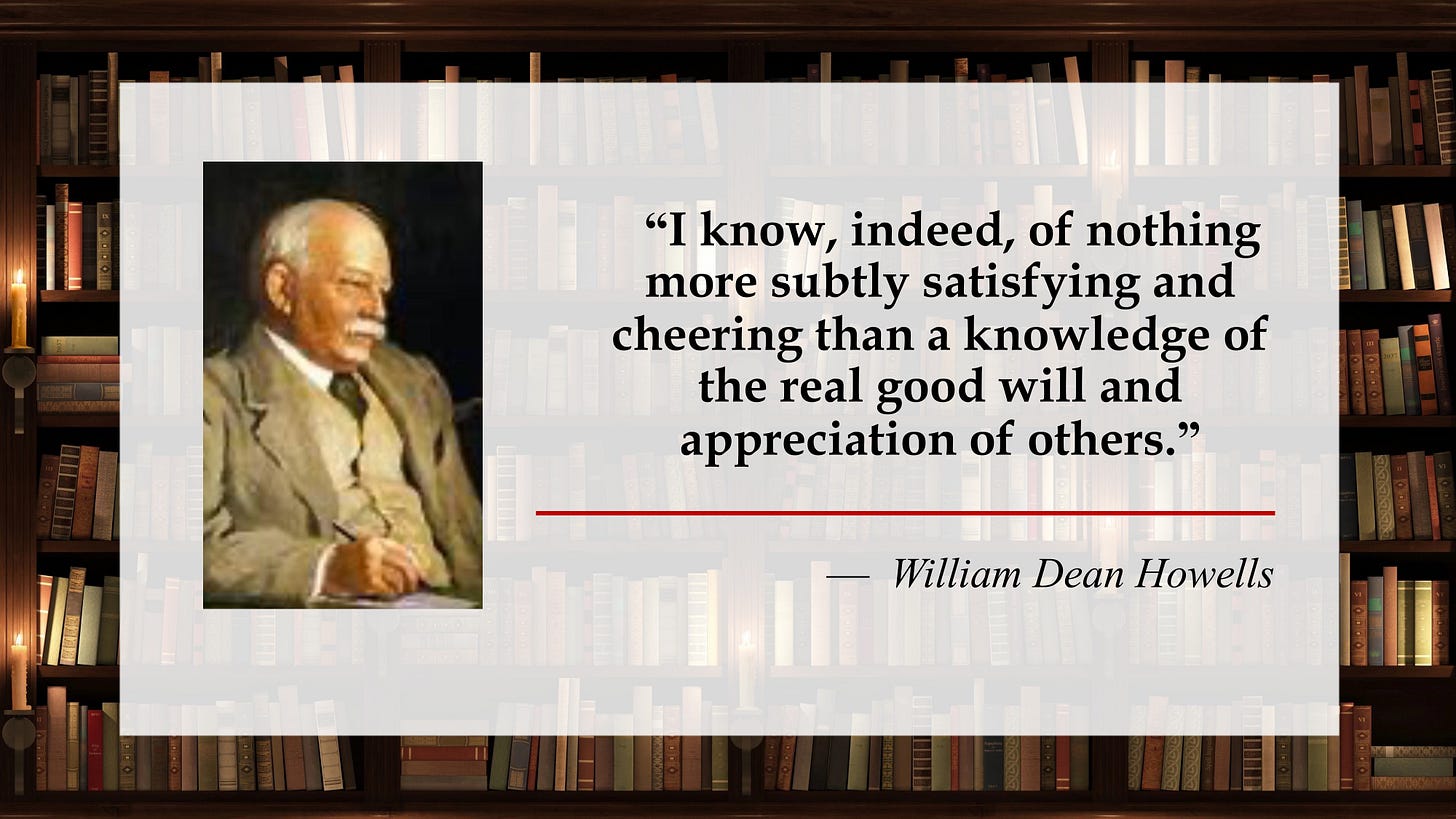
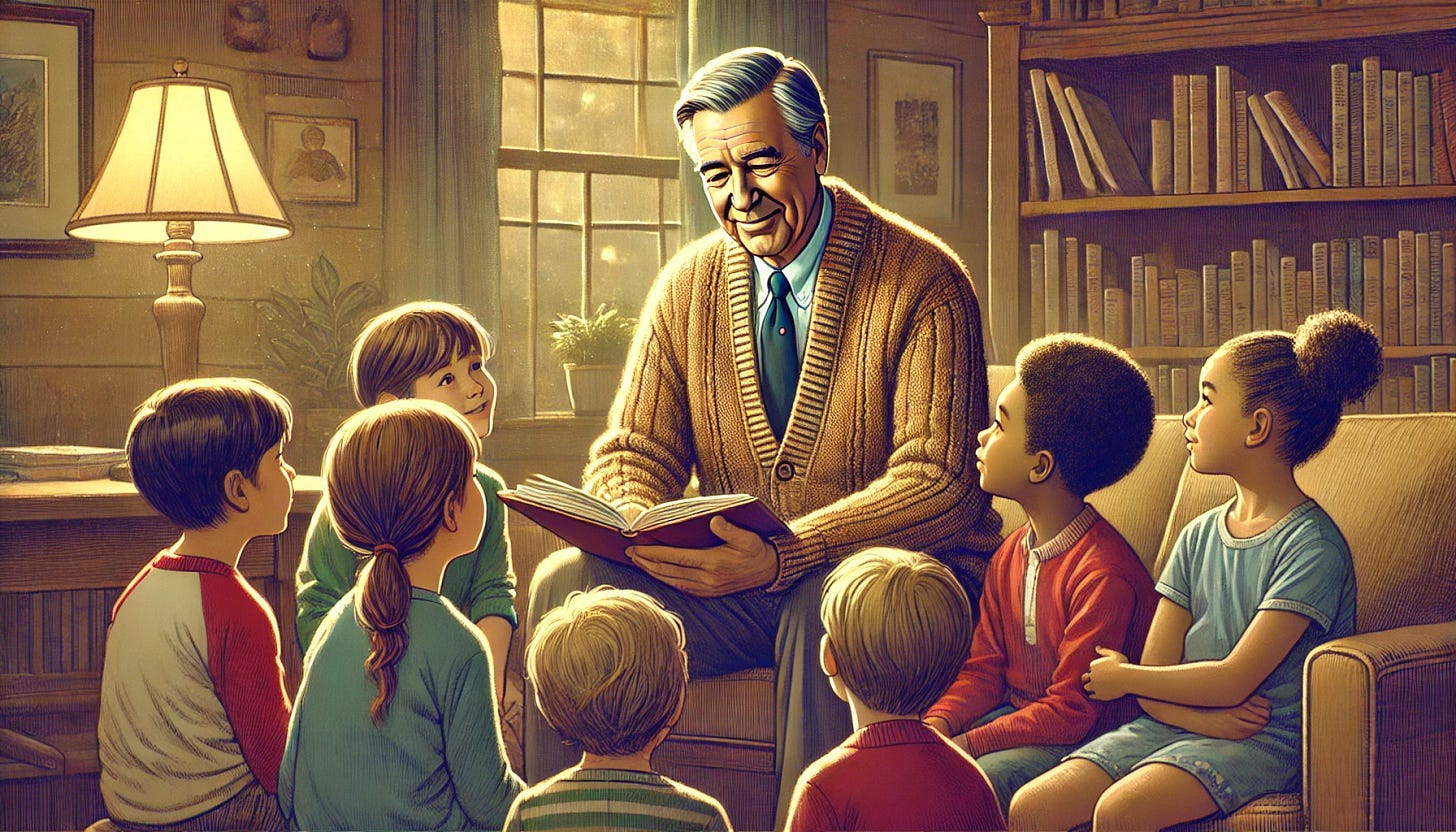

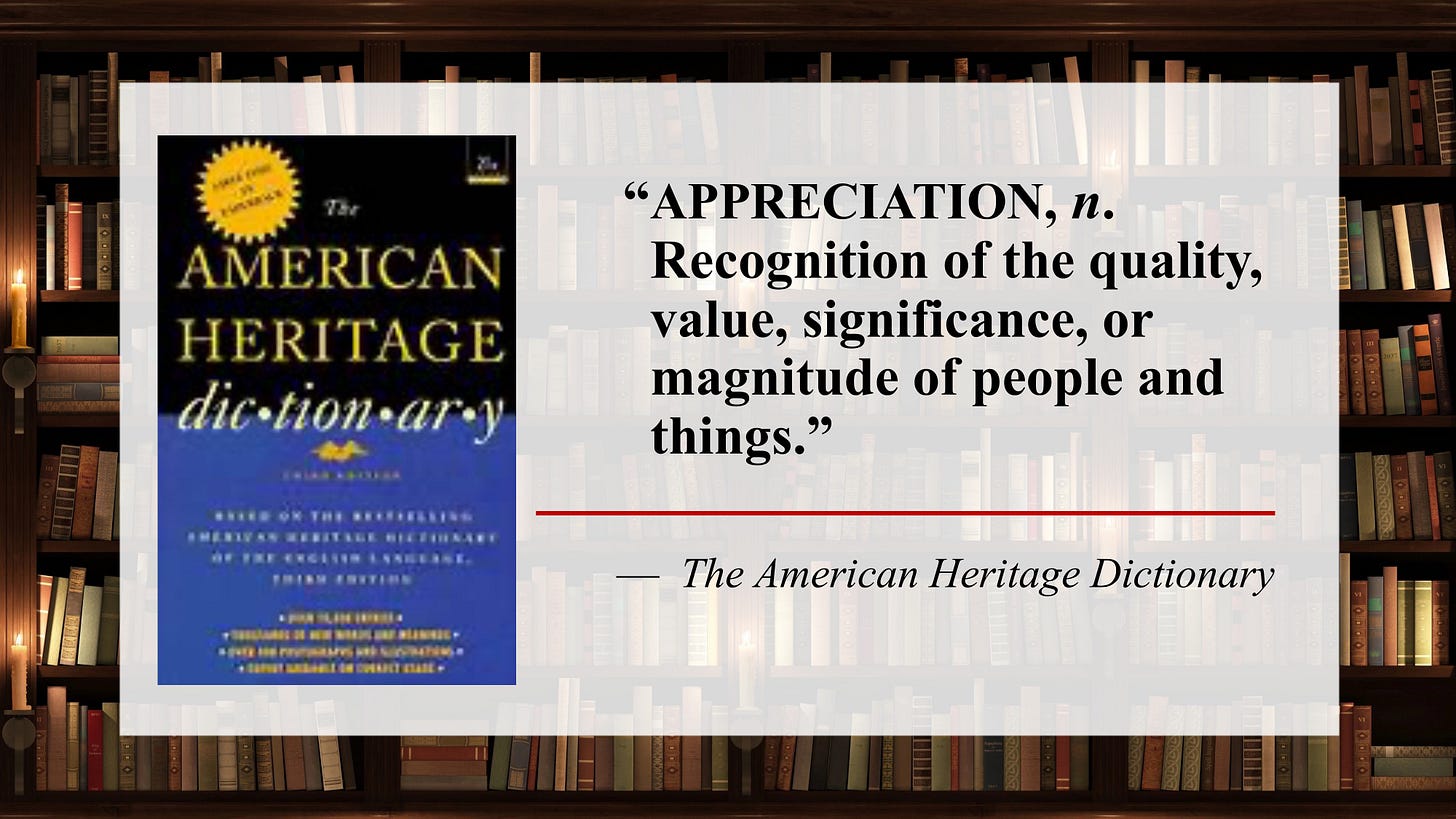

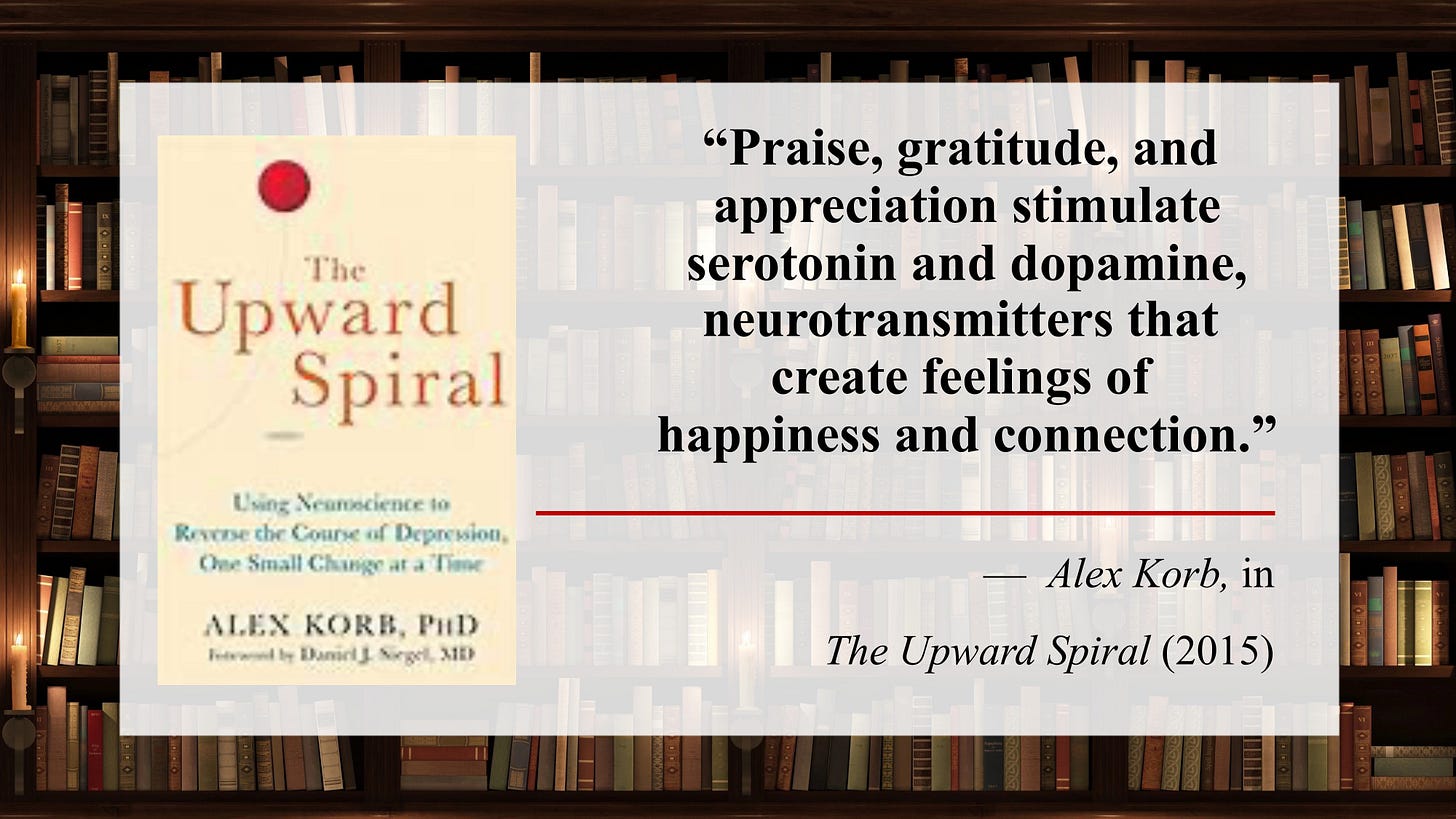
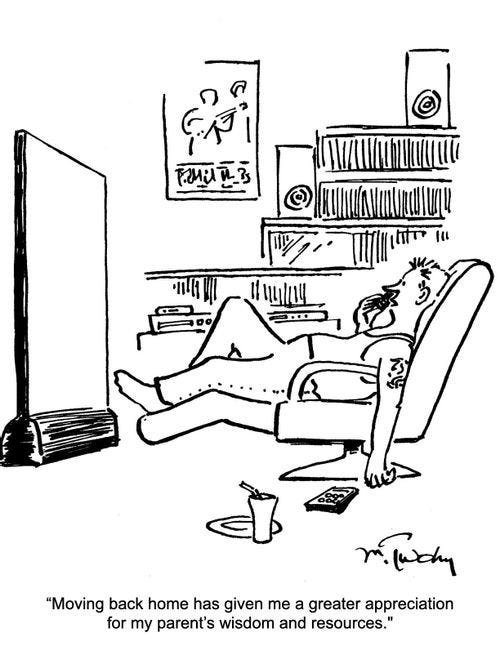

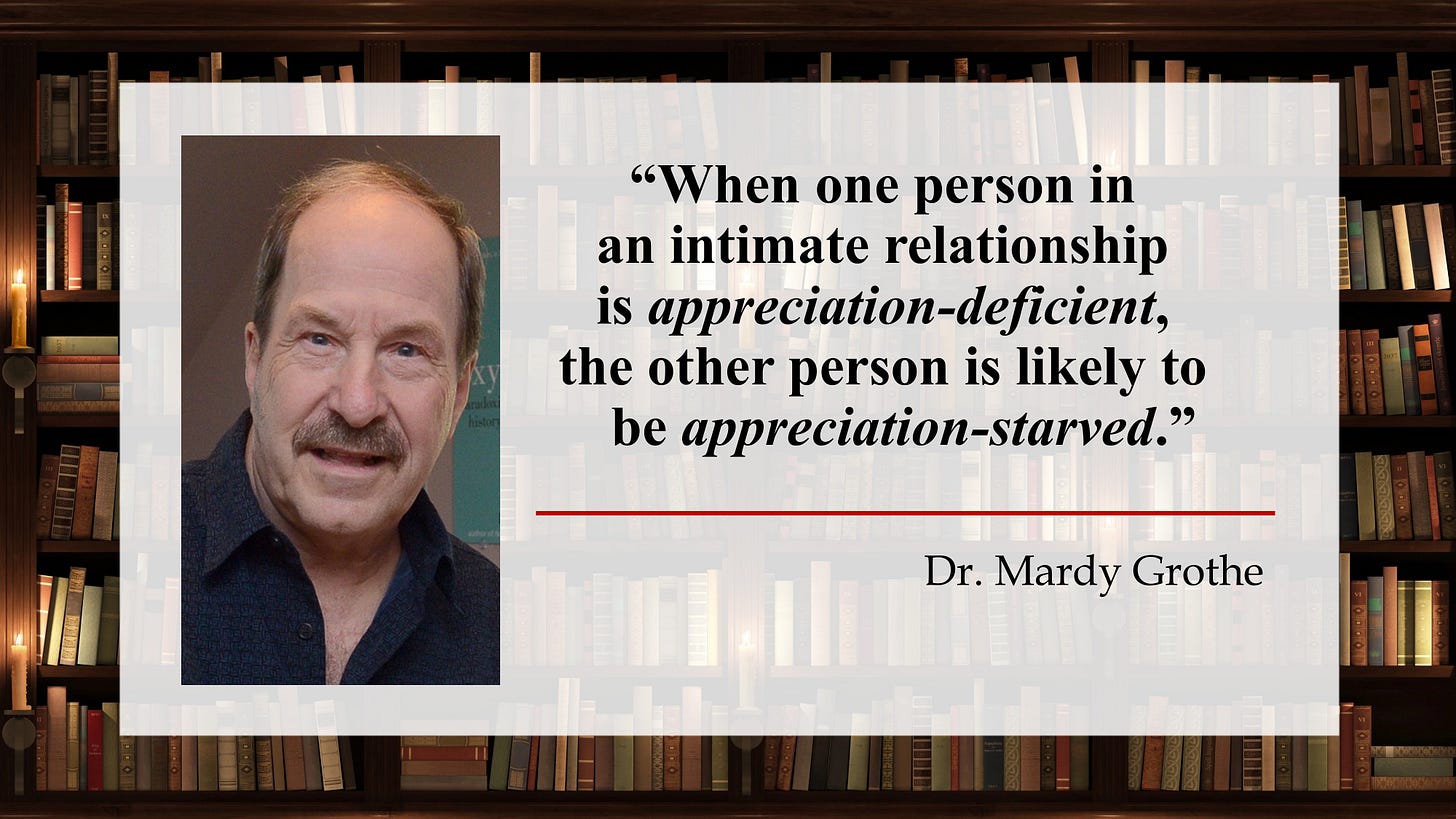
While I appreciate the logic and science behind the reaction to appreciation, Mardy, I wonder if there may be something deeper in the reason for that reaction. When someone expresses appreciation for something that you have done, it indicates that you have made a positive difference in that person's life. In doing so, in some small way, it confirms the value of your life - something that may live on after you are gone. (Or is that just a feeling specific to an atheist?)
Mardy, I pray that the Great physician will be present in the operating suite to guide the hands and minds of the gifted physicians who will perform your procedure this week. I pray for your speedy recovery. I also wanted to express my deep appreciation for the wonderful gift your words and posts have provided in my life for so many years!! In a world where forces for good are in short supply, you are a voice of comfort, challenge and positive change! Thank you! Thank you! I look forward to next week’s post!